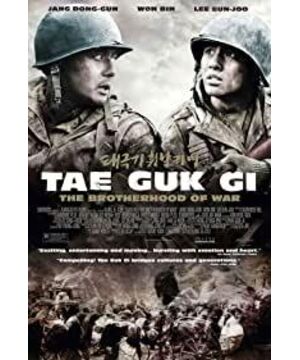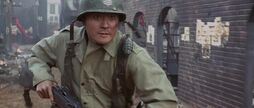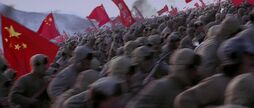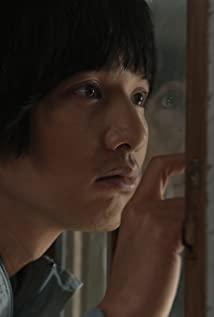For example, "Infernal Affairs".
I waited and waited until the people in the world stopped talking about him. I pushed the disc into the machine. Starting from the explanation of Infernal Affairs, I saw Tony Leung lying at the elevator entrance, staring at the elevator door. Hit him all at once--the small bullet in the middle of his eyebrows was so obvious.
Then, the music of "Goodbye Police" sounded, and I echoed the people who lost their lives in these stories in the silent space.
It's the same with watching "Tai Chi Flag Flying".
How insignificant the emotions of the world are in wars, politics, or other events that are artificially created by society, and even today have become things that people ridiculed-even though Europe, Hollywood, South Korea and Japan, Always use emotion to earn people's tears and money in their film and television works irrelevantly.
However, we are still moved by the emotions in these film and television works they made, like the sweet and beautiful feeling when we walk into McDonald's and eat a hamburger when we are hungry.
The North Korean army will inevitably be vilified in the film, just as when we were shooting war movies like "The Great Battle", the KMT would be very cruel and useless. Although he has long understood the historical truth, he still finds it difficult to accept the demonization of the North Korean army. However, the brilliance of "Taichi Flag Flying" is not to express war or specifically criticize North Korea. Of course, every time North Korea or China launches a counterattack in the film, the scenes of the displaced South Korean people are often given to people. A strong guiding effect.
The love of brotherhood in the movie is very touching, and it made me cry many times, and my brother was well performed by the screenwriter or director—from single-mindedly fighting and killing people in exchange for meritorious service for my brother to be safe and returning home. A war machine, this kind of alienation feels terrifying.
In the past, many war critiques mentioned that war will alienate people, and there are many similar movies and televisions, often depicting how a kind person and a principled person turned into a war madman in the end. However, what "Flying Tai Chi Flag" shows is to make his brother change little by little, and he can't feel this change, because he has always believed that his original intention has not changed in exchange for his brother's retirement. In fact, the movie is not willing to make clear his complete change. Even if he eventually becomes a beast that kills people without knowing his relatives, he must be arranged to surrender to North Korea to complete this change. It is precisely this point that did not bring such a strong critical atmosphere, but knocked people down. The kind of emotion that was stirred up is enough to make people hate anyone who initiates a war.
What I want to say is the real shock of the movie: after the South Korean regime regained Seoul, the plot of people who worked for the North Korean Communist Party was executed casually. And these people who declared that others treason and then executed the death penalty without expression were not the government, but the people who were tortured by the war. As a Chinese, looking at the scenes of the war, you can more or less think of your side, which makes people feel chilling.
This is not just the proposition of the so-called alienation of people in war. It shows a long-term motif—that is, there must be a devil hidden in people's hearts anyway, and this devil will come out in due course, even in a just face. , Arbitrarily seize the sincerity, tolerance, and even the inherent freedom that human beings originally enjoy-no matter actions, thoughts, or even souls.
If I finish talking, my blog will be too long, so let's stop here. We are so small, no matter if we face the vast universe, long history, or the iron-like state machine... Having
said so much, after watching this film, in fact, what I want to do most is to tell my brother how much I love him. of.
View more about Tae Guk Gi: The Brotherhood of War reviews









